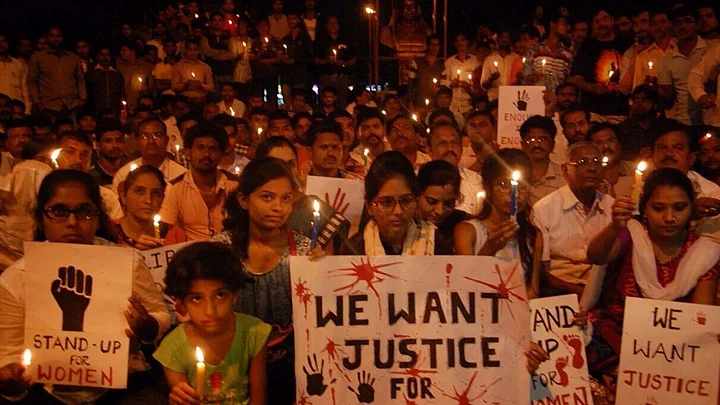Anger. Rage. Helplessness. Frustration. These are the emotions I have gone through in varying degrees since the news of the rapes in Unnao and Kathua shook the nation.
An eight-year-old girl was raped and murdered in Jammu’s Kathua in January 2018 – allegedly to intimidate the Bakarwal community; a teenager was allegedly raped by a BJP MLA in Unnao, Uttar Pradesh last year. The heinousness of the crimes and the collective apathy of the administration and the shameful audacity of those defending the accused had me convinced about the hopelessness of the times we live in.
As I went through my social media feed that was bursting with outrage over the crimes, I was tormented by a familiar set of questions: how many more will have to suffer before this monstrous cycle of violence against women can end? Will there will ever be a good time to be a woman in India? I think not, at least for as long as we have politicians who unabashedly give such instances a religious hue. Time and again, our so-called leaders have let us down. This is perhaps why I was cynical about attending the midnight protest march called by Congress chief Rahul Gandhi at the capital’s India Gate on the intervening night of 12-13 April. I was not ready for a political gimmick on this.
But I am glad I went. The things I saw filled me with hope – hope in the democracy, hope against the forces who want to divide us on communal lines and hope in the youth of the country who are losing patience.
Divided by Religion, United by Humanity

In the Kathua case, the details of the chargesheet reveal that the child was raped and murdered by perpetrators who allegedly wanted to “dislodge” her community from the area. The brutality of such a crime makes me nauseous. Have our religious differences gotten to a point where we are willing to kill one another?
“Kab tak Hindu-Muslim jhagdon mei apni bachchiyon ko kurban hone denge? Koi mazhab iski ijaazat nahi deta. (How many more children will we sacrifice at the altar of Hindu-Muslim conflict? No religion allows this)”, said a woman who was marching by my side in the protest.
“I am a Hindu and I feel ashamed to call these people one of my own,” said a young student as tears welled up in her eyes.
I think the time has come when we have to make a decision. Are we going to allow things to continue the way they are continuing with all this rape, misogyny, murder, corruption, violence, unfettered monstrosity going on in our society every day or we are going to say enough is enough?Dhruv Sangari, Sufi singer at the protest
People from all walks of life – politicians, civil society members, activists, journalists, students came out in huge numbers to demand justice.
The protesters at the march were not Hindus, Muslims, Sikhs or atheists. They were just people who had gathered to protest injustice. They may follow different faiths but their blood boils the same way when they see injustice being propagated. We may be divided by religion but we are united by humanity. And that gives me hope.
“At This Time, We Must Stand Together”

“I am here to protest the gangrape in Kathua, in Badaun and the kind of violence which is being spread all across India,” said social activist and human rights campaigner Shabnam Hashmi.
“I’m here to protest the normalisation of violence which is taking place. This is not a civil society protest but we saw a tweet by Rahul Gandhi and decided at this hour we must be together,” said Hashmi, who was one of the participants.
“As a citizen of this country, and as a woman, I am scared,” said a woman who was among the protesters. “I seek justice and an assurance of safety,” she told me, anger and despair palpable in her voice.
“How can the government condone this crime? What are we to make of our safety and society if those who are vested with the job of our security turn into our violators?” a young woman at the march asked me, referring to BJP MLA Kuldeep Singh Sengar – the main accused in the Unnao case.
“We Want Answers”
"If people from the government are supporting these crimes, and have been accused of some of these heinous crimes, then I think the government is answerable to us”, said Dhruv Sangari, a protester. His sentiments were echoed by the thousands who had gathered at the capital’s India Gate at midnight.
Slogans such as “ladkion ko nyaya dena hoga” and “Yogi-Modi gaddi chodo” filled the air, with protesters demanding answers from the government.
I could sense a collective anger against the Prime Minister as well as the women leaders of the ruling NDA – for their deafening silence, and for not doing enough.
Indians, Now Is the Time to Reclaim the Streets

Watching Rahul Gandhi at the march made me feel like this was a politician who was not at the march for political mileage. It was inconsequential to me that this was a march called by a political party.
Because the midnight march was so much more than Rahul Gandhi or Narendra Modi. It was about a cause that takes precedence over all politics, polarisation and propaganda.
Watching my people come out on the streets to demand answers from the government, gave me hope. Here were others like me who just wanted justice, peace and harmony above all else.
To my fellow Indians I just have one thing to say – leave the comforts of your own homes, and armchair activism on social media. Reclaim the streets, scream for justice, demand answers. If this doesn’t shake your consciousness, nothing else will.
(At The Quint, we question everything. Play an active role in shaping our journalism by becoming a member today.)



